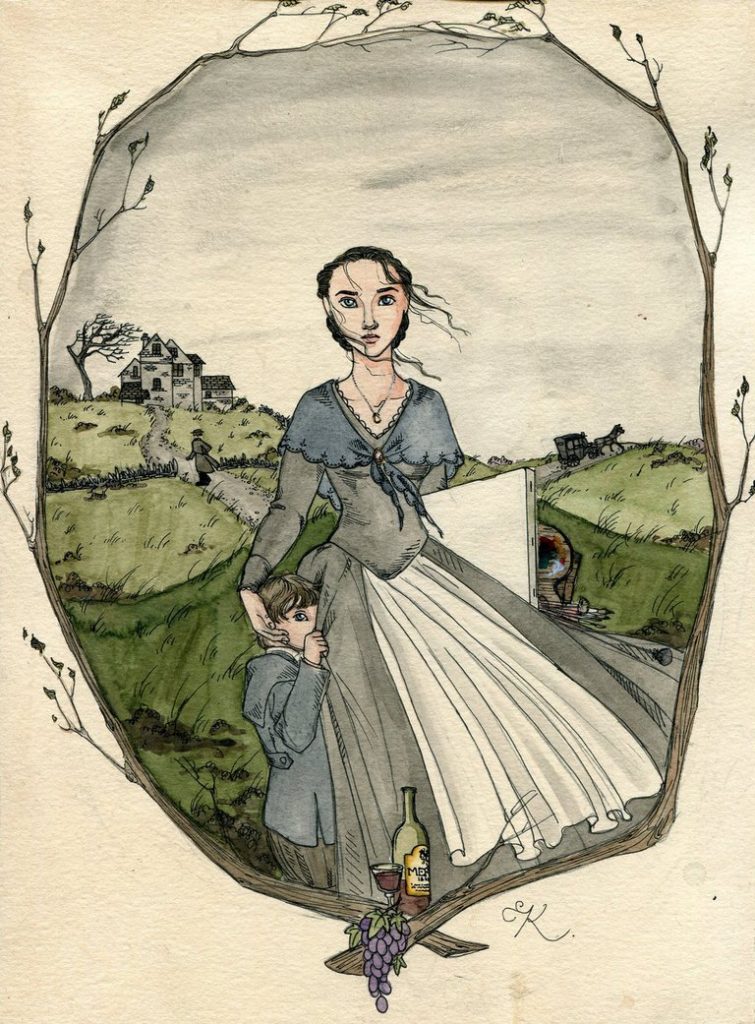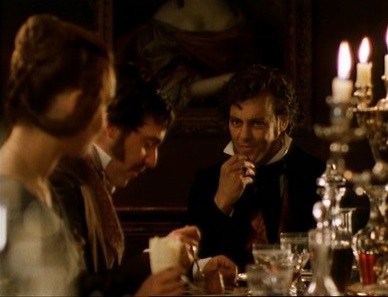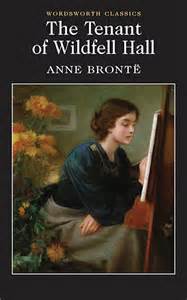The Tenant Of Wildfell Hall by Anne Brontë was an entire mistake. It should never have been written, and it would be better for everyone if it never saw the light of day again. These aren’t my views of course, in my eyes Anne Brontë’s second and final novel is a soaring work of genius. Nor are they the harsh words of a critic, although many contemporary critics were in agreement that this was a rough, brutal, ungodly book. No, these words are the judgement of Anne’s elder sister Charlotte Brontë, and they would have a huge impact upon Anne’s reputation.
After the deaths of Emily and Anne Brontë within a few cruel months of each other in 1848 and 1849, the novel writing career of the two sisters, that had seemed so full of promise, was ended. Charlotte’s publisher, Smith, Elder & Co., approached her and asked if she would prepare new editions of her sisters’ novels to be published by them as a lasting tribute (the original editions published by Thomas Cautley Newby being put together in a decidedly sub-par manner). Charlotte was happy to do this for Wuthering Heights (although she changed much of Joseph’s dialogue to make it a bit more intelligible to readers outside of Yorkshire) and Agnes Grey, but she would not consent to do so for The Tenant Of Wildfell Hall. This was her verdict in the letter to the publishers:
‘”Wildfell Hall” it hardly appears desirable to preserve. The choice of subject in that work is a mistake.’
This verdict was unfortunately to be a lasting one. In effect Charlotte prevented the re-publication of The Tenant Of Wildfell Hall at a time when it was still in the public eye, and when it had in fact been a huge success – the first edition selling even quicker than Jane Eyre had. The novel was buried along with its writer, and would in fact not be published again until another ten years had passed.

This removal of Anne’s great novel from the Brontë canon caused great damage to her place in literary history. By the time the book reappeared it had been almost completely forgotten, and people thought of Anne as merely a footnote in the story of the brilliant Charlotte and Emily Brontë. Unfortunately, this attitude endured for a century and more, and only now is the book and its author getting the recognition they deserve.
In 1850, a year after Anne’s death, Charlotte Brontë finally revealed her sisters’ true identities to the world in her ‘Biographical Notice of Ellis and Acton Bell.’ It is a short and strange biography, painting the sisters in a different light to how we know them to have been – emphasising their lack of education, and apologising for perceived failures in their writings. Once again, Charlotte acknowledged how wrong Anne had been to write The Tenant Of Wildfell Hall:
‘The choice of subject was an entire mistake… She [Anne] had in the course of her life, been called on to contemplate, near at hand and for a long time, the terrible effects of talents misused and faculties abused; hers was naturally a sensitive, reserved and dejected nature; what she saw sank very deeply into her mind; it did her harm. She brooded over it till she believed it to be a duty to reproduce every detail as a warning to others.’
This is a clue to one reason why Charlotte hated the book so much – she blamed it for Anne’s death. The intensity of the book, and Anne’s refusal to stray away from the truth brought a mental and physical strain that was greater than her frail, youngest sister could bear.
There is another clue in Charlotte’s paragraph above: Anne had for too long had to witness talents misused and faculties abused, and rather than ignoring this dread spectacle she had put it on paper as a warning to others. Read between the lines, and it’s clear to see that Charlotte believed the book was about their own brother Branwell. During his final and fatal decline into drink and opium addiction, Charlotte had turned her back on the brother who had once meant more to her than anything in the world – with one contemporary chronicler saying that she didn’t speak to him for two years. Anne, however, took a different course, and in Charlotte’s eyes a very wrong course.
Anne Brontë believed above all things in the power of redemption. However great a sinner you were, however many your faults and mistakes, you would eventually be redeemed and find peace in Heaven. This is at the hear of Anne’s poem The Penitent and especially at the heart of The Tenant Of Wildfell Hall.
We see Arthur treating his wife Helen appallingly, drinking to excess, having wild drink and drug fuelled parties, disappearing for months at a time, verbally beating her into submission, stealing her possessions, destroying her work. And yet, after Helen’s escape to Wildfell Hall she returns to him to nurse him in his final illness. Why? Because it is the right thing to do, whatever the cost to herself, and because she believes that she can still save his soul.

Charlotte was undoubtedly shocked at some of Branwell’s failings being exposed to the world in the shape of Huntingdon, although he is also present in the character of Lowborough, who deep down has a good heart and tries, and fails, to beat his addictions. Even more terrible to Charlotte was that it brought home to her her failings in Branwell’s last months and weeks. She had not stood by Branwell in the way that Anne and Emily had, and now it was too late. The book was too painful for her to read, and the thought of others reading it and passing judgement, unwittingly, on both Branwell and her was also too painful to contemplate. It was for this reason above all others that Charlotte had The Tenant Of Wildfell Hall suppressed.
Charlotte’s judgement on the book and upon Anne Brontë was all wrong. Writing the book did not do Anne Brontë harm, she was not the frail thing her sister always pictured. She was a strong woman with a burning desire to tell the truth by holding a mirror up to society’s failings. That is why The Tenant Of Wildfell Hall is more relevant today than it has ever been, and as loved today as it has ever been. It is a book that has overcome misunderstanding, contempt, suppression. Its time is now.

Thank you. Good comment and lovely drawing.
I suppose it is sacrilegious to say it on this website, but my own opinion is that “The Tenant” (and indeed “Agnes Grey”) are not in the sane league as Jane Eyre and Wuthering Heights. In fact, if I had to rank them, I would put Jane Eyre in the Premiership, Wuthering Heights in the First Division (for all its passion it is in my opinion a flawed novel -perhaps if Emily had lived she might have revised/edited it), and The Tenant, Agnes Grey, The Professor, Villette all in the second division. Having said that, Charlotte certainly should not have tried to suppress The Tenant which is a powerful and moving story when you think of what Anne went through – the heartbreak of witnessing her brother’s decline. Addiction and mental illness are such huge issues in our society today, and I do agree that The Tenant is of gteat relevance to us as no doubt it was in the 19th century.
Agree with this. For those who must judgment Charlotte, please consider the following: she suffered the grief of losing two sisters as well as a brother and was perhaps not thinking of posterity if she was thinking clearly at all; at the time, her elderly father was still alive and working as a parson and may have suffered not only emotionally but financially from the repercussions of widely advertising family problems; and finally, the modern notion that all publicity is good publicity did not exist in Victorian England, where shame was still an emotion that people could and did feel.
As much as I admire “Jane Eyre” and “Wuthering Heights”, I believe “The Tenant of Wildfell Hall” to be the best Brontë novel I have ever read. I did not base my opinion on Charlotte’s suppression of Anne’s novel. I personally found Anne’s novel to be more realistic and unlike the other two, I thought it had a stronger conclusion.
To often a reputation, interpretation solidifies based upon very biased opinion, and lives on. It’s so important to review the context and motivations to try to determine significance of a work of art, an event, etc..
Thank you for your research.
As a personal opinion, Anne’s book surpass both of her sisters. After extensive reading (and nobody will ever know the entire truth as Charlotte destroyed so many of her sisters personal letters), I believe Charlotte was jealous of her sisters success and that is why she suppressed her republishing, I love these stories far more than either JE or WH.
I honestly dont think it was out of jealousy. Its clear Charlotte had a very high idea of doing what was right. I think she trully believed she was doing what was right.
Tenant is indeed a remarkable book, but it is quite different in purpose, style and intensity from the great trilogy of Bronte novels–Jane Eyre, Wuthering Heights and Villette. those who denigrate Villette have little understanding of what Charlotte was attempting–and achieving–in that book, which is as amazing as Jane Eyre and more mature. And Wuthering Heights is a one-off–I wonder if Emily could have written any other book with the passion and interlocking characters of Wuthering–one of the most extraordinary fictional works in English.
The feminist aspect of the Tenant is very powerful and the domestic abuse revealed says much to us today. Anne was so brave to present this aspect so realistically in a time when most women felt powerless in a strong patriarchal society. We have come a long way since the time The Tenant was set and many people reading this will appreciate what we have today and what we can still do to address the gender imbalance in our society.